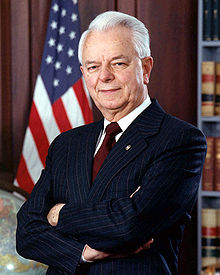Robert C. Byrd
| Robert Byrd | |
|---|---|
 |
|
|
United States Senator from West Virginia |
|
|
In office January 3, 1959 – June 28, 2010 |
|
| Preceded by | Chapman Revercomb |
| Succeeded by | Carte Goodwin |
| President pro tempore of the United States Senate | |
|
In office January 3, 2007 – June 28, 2010 |
|
| Preceded by | Ted Stevens |
| Succeeded by | Daniel Inouye |
|
In office June 6, 2001 – January 3, 2003 |
|
| Preceded by | Strom Thurmond |
| Succeeded by | Ted Stevens |
|
In office January 3, 2001 – January 20, 2001 |
|
| Preceded by | Strom Thurmond |
| Succeeded by | Strom Thurmond |
|
In office January 3, 1989 – January 3, 1995 |
|
| Preceded by | John Stennis |
| Succeeded by | Strom Thurmond |
| President pro tempore emeritus of the United States Senate | |
|
In office January 3, 2003 – January 3, 2007 |
|
| Preceded by | Strom Thurmond |
| Succeeded by | Ted Stevens |
| Senate Majority Leader | |
|
In office January 3, 1987 – January 3, 1989 |
|
| Deputy | Alan Cranston |
| Preceded by | Bob Dole |
| Succeeded by | George Mitchell |
|
In office January 3, 1977 – January 3, 1981 |
|
| Deputy | Alan Cranston |
| Preceded by | Mike Mansfield |
| Succeeded by | Howard Baker |
| Senate Minority Leader | |
|
In office January 3, 1981 – January 3, 1987 |
|
| Deputy | Alan Cranston |
| Preceded by | Howard Baker |
| Succeeded by | Bob Dole |
| Senate Majority Whip | |
|
In office January 3, 1971 – January 3, 1977 |
|
| Leader | Mike Mansfield |
| Preceded by | Ted Kennedy |
| Succeeded by | Alan Cranston |
| Chairman of the Senate Appropriations Committee | |
|
In office January 3, 2007 – January 3, 2009 |
|
| Preceded by | Thad Cochran |
| Succeeded by | Daniel Inouye |
|
In office June 6, 2001 – January 3, 2003 |
|
| Preceded by | Ted Stevens |
| Succeeded by | Ted Stevens |
|
In office January 3, 2001 – January 20, 2001 |
|
| Preceded by | Ted Stevens |
| Succeeded by | Ted Stevens |
|
In office January 3, 1989 – January 3, 1995 |
|
| Preceded by | John C. Stennis |
| Succeeded by | Mark Hatfield |
| Member of the U.S. House of Representatives from West Virginia's 6th district |
|
|
In office January 3, 1953 – January 3, 1959 |
|
| Preceded by | Erland Hedrick |
| Succeeded by | John Slack |
| Member of the West Virginia Senate from the 9th district |
|
|
In office December 1, 1950 – December 23, 1952 |
|
| Preceded by | Eugene L. Scott |
| Succeeded by | Jack A. Nuckols |
| Member of the West Virginia House of Delegates | |
|
In office 1947–1950 |
|
| Personal details | |
| Born |
Cornelius Calvin Sale, Jr. November 20, 1917 North Wilkesboro, North Carolina, U.S. |
| Died | June 28, 2010 (aged 92) Merrifield, Virginia, U.S. |
| Resting place | Columbia Gardens Cemetery, Arlington, Virginia, U.S. |
| Political party | Democratic |
| Spouse(s) | Erma James (1937–2006) |
| Alma mater | |
| Signature | |
Robert Carlyle "Bob" Byrd (born Cornelius Calvin Sale, Jr.; November 20, 1917 – June 28, 2010) was a United States Senator from West Virginia. A member of the Democratic Party, Byrd served as a U.S. Representative from 1953 until 1959 and as a U.S. Senator from 1959 to 2010. He was the longest-serving U.S. Senator and, at the time of his death, the longest-serving member in the history of the United States Congress. (In June 2013, his record was surpassed by U.S. Representative John Dingell of Michigan, though Byrd is the longest-serving Senator.) Prior to his death in 2010, Byrd was the last remaining member of the U.S. Senate to have served during the presidency of Dwight Eisenhower and prior to the 1960 election of President John F. Kennedy. Byrd is also the only West Virginian to have served in both houses of the state legislature and both houses of Congress.
Byrd served in the West Virginia House of Delegates from 1947 to 1950, and the West Virginia State Senate from 1950 to 1952. Initially elected to the United States House of Representatives in 1952, Byrd served there for six years before being elected to the Senate in 1958. He rose to become one of the Senate's most powerful members, serving as secretary of the Senate Democratic Caucus from 1967 to 1971 and—after defeating his longtime colleague, Ted Kennedy—as Senate Majority Whip from 1971 to 1977. Byrd led the Democratic caucus as Senate Majority Leader from 1977 to 1981 and 1987 to 1989, and as Senate Minority Leader from 1981 to 1987. From 1989 to 2010 he served as the President pro tempore of the United States Senate when the Democratic Party had a majority, and as President pro tempore emeritus during periods of Republican majority beginning in 2001. As President pro tempore, he was third in the line of presidential succession, behind the Vice President and the Speaker of the House of Representatives. He also served as the Chairman of the United States Senate Committee on Appropriations from 1989 to 1995, 2001 to 2003, and 2007 to 2009, giving him extraordinary influence over federal spending.
...
Wikipedia
